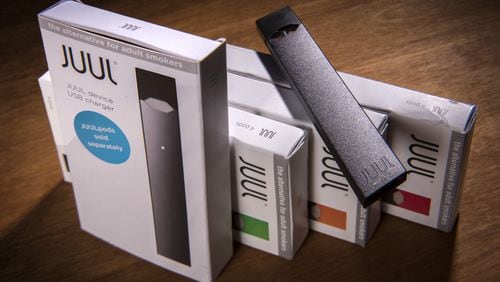The e-cigarette maker Juul’s retail sales increased last year right along with Juul-related tweets, whose growth “exploded” over that time, according to a new study led by researchers at Georgia State University’s School of Public Health.
It’s just one of the study’s findings suggesting that traditional surveys aren’t showing the correct trend for U.S. e-cigarette use, and that a savvy social media marketing campaign by Juul has drawn unseen new users to the vaping product.
Juul’s e-cigarette competitors made by tobacco companies relied on traditional TV and other advertising, and they eventually saw their sales bog down, the study says. But Juul has relied on much cheaper Instagram, Twitter and YouTube. The study looked at e-cigarette sales in stores that are tracked by Nielsen, and it found that Juul sales there for the last quarter alone of 2017 were $150 million.
Moreover, the findings indicate that Juul’s sales are so strong they are lifting the overall market: All e-cigarette sales in 2017 increased 47 percent, and now top $1 billion annually, the study found.
“The decrease in marketing expenditures for Juul over time masks its highly successful, influential, engaging, wide-reaching campaigns on social media,” the authors concluded.
Instagram, Twitter and Youtube are used disproportionately by young people. Regulators and health advocates are anxious to stem the use of vaping, especially among youths. Vaping is gaining a foothold in the U.S. just as traditional cigarettes definitively decline in use.
The Food and Drug Administration has cracked down on retailers that sell e-cigarettes to minors, which is illegal.
In vaping, a device substitutes for a cigarette. Instead of tobacco smoke, users inhale a vapor that is often laced with the addictive substance nicotine. One Juul "pod" refill contains roughly as much nicotine as would be in an entire pack of tobacco cigarettes. Nicotine is problematic for brain development and heart health, and Juul emphasizes that it is illegal for minors to use its products.
But they do use them. And Juul produces flavors that critics say appeal to them, such as mango, fruit medley and creme brulee.
A second challenge for health advocates is to even know when use is increasing, since traditional survey methods asking people whether they use e-cigarettes might not capture a young teen who is trying Juul and doesn’t think of vaping that way.
Starting the study, GSU researchers saw national surveys that showed declines in e-cigarette use between 2015 and 2016. But they also saw reports of increased use of Juul by young people. They decided to systematically look into Juul’s growth and marketing.
They used Juul-related hashtags and keywords to comb through tweets, YouTube videos and Instagram posts. And they harvested sales data for Juul and its major competitors from retail store scanners. They acknowledge that wouldn’t necessarily show whether a few people were suddenly buying much more of the product.
Juul representatives did not immediately respond to an email request for comment for this story.
About the Author







